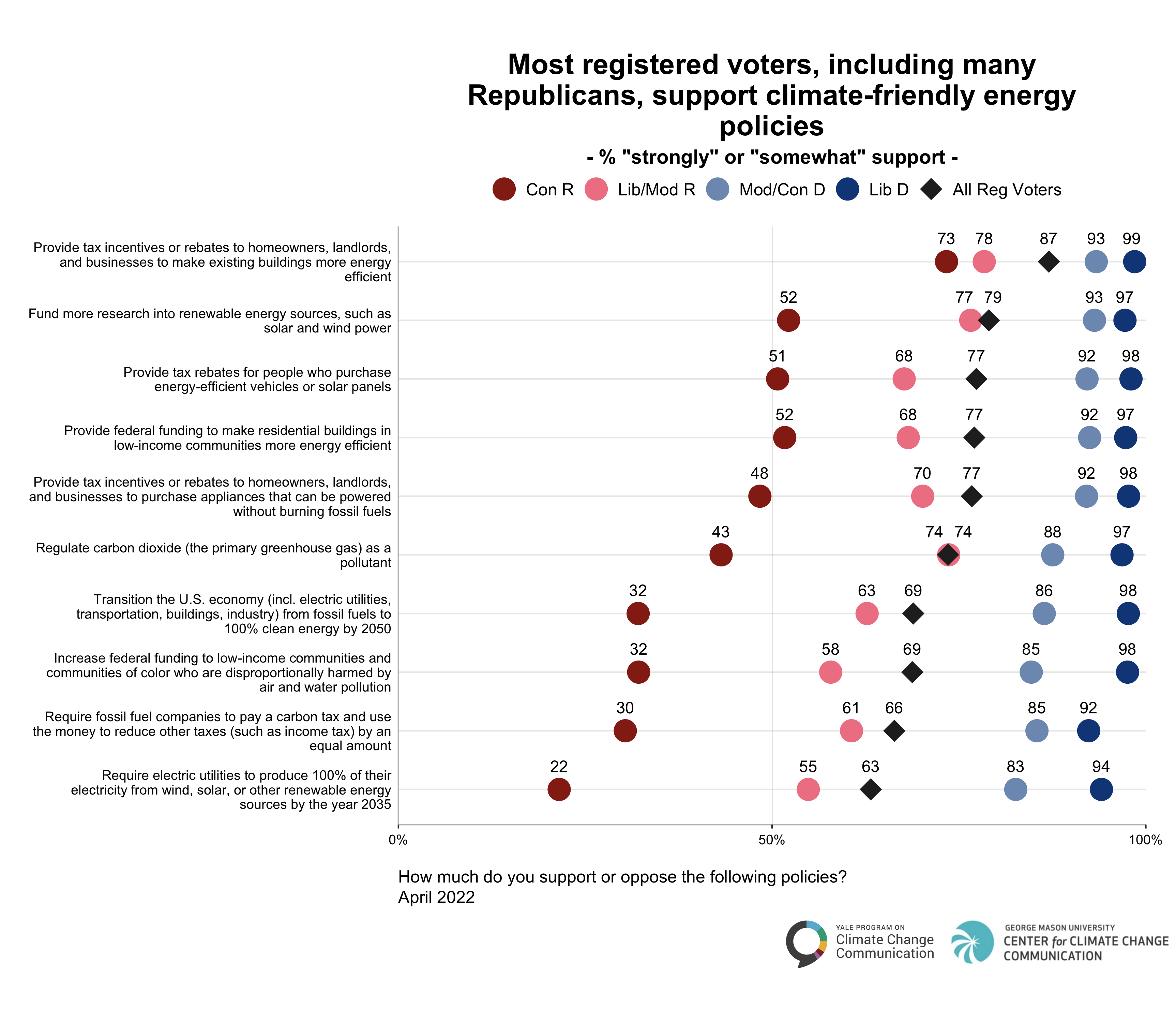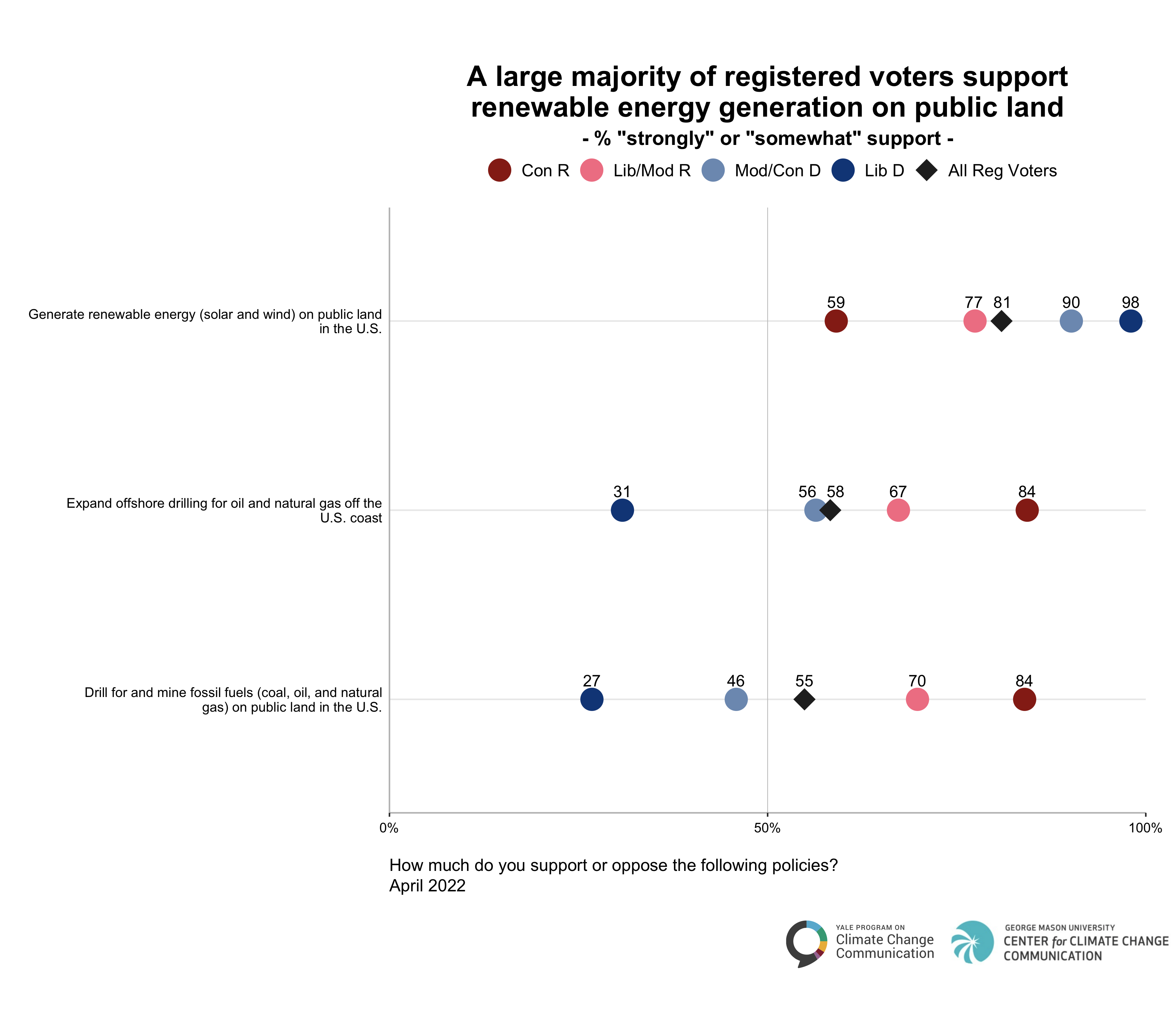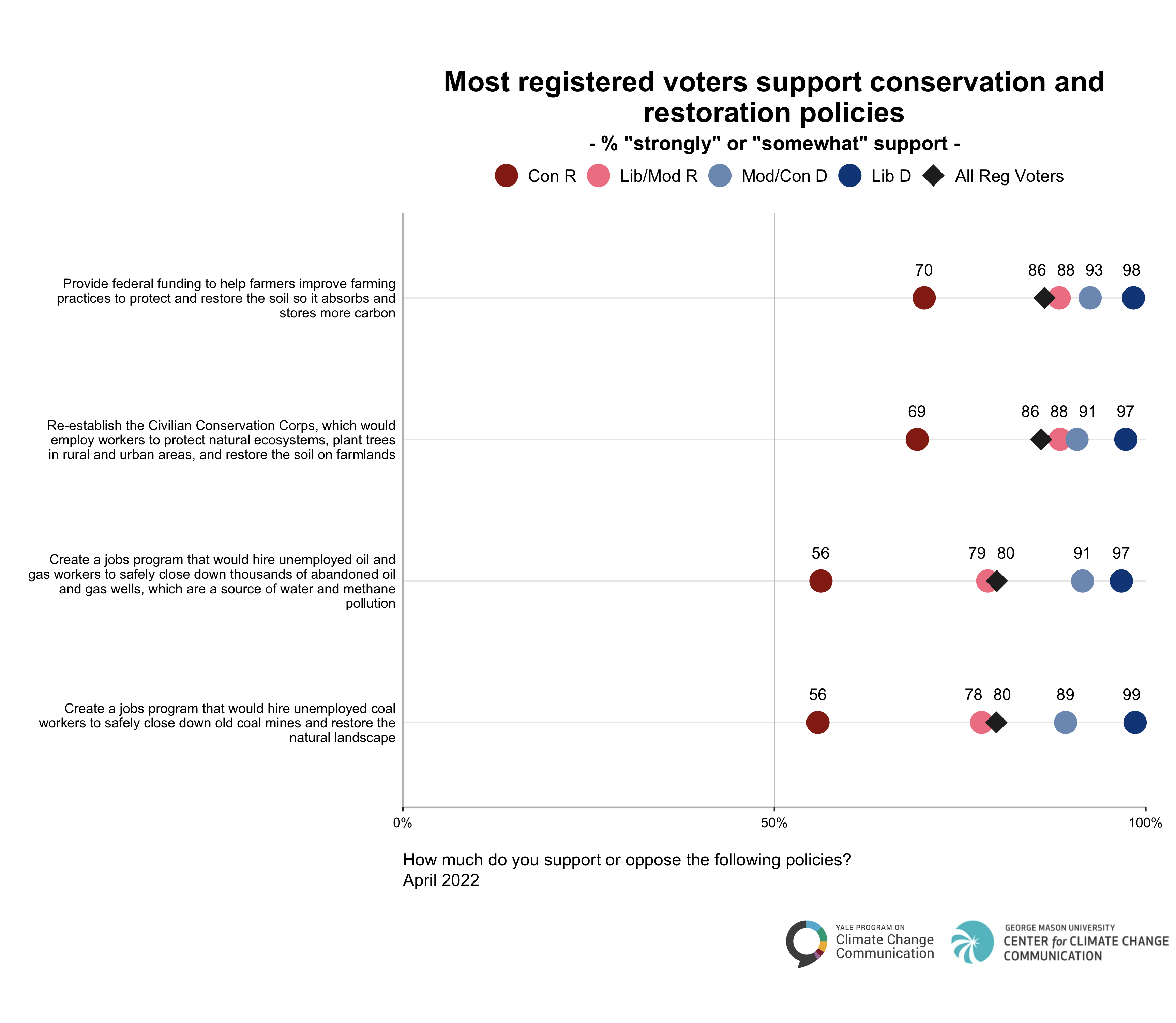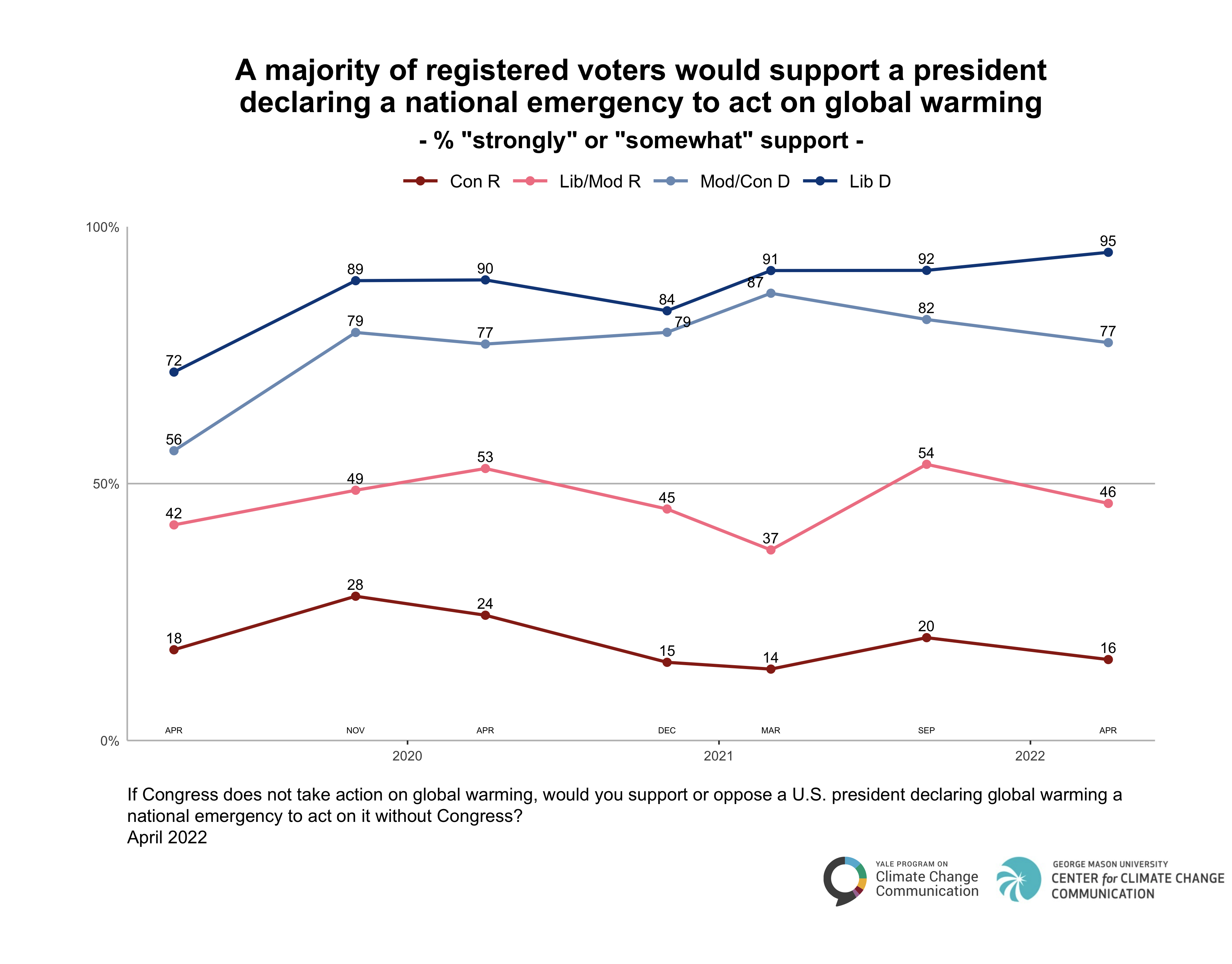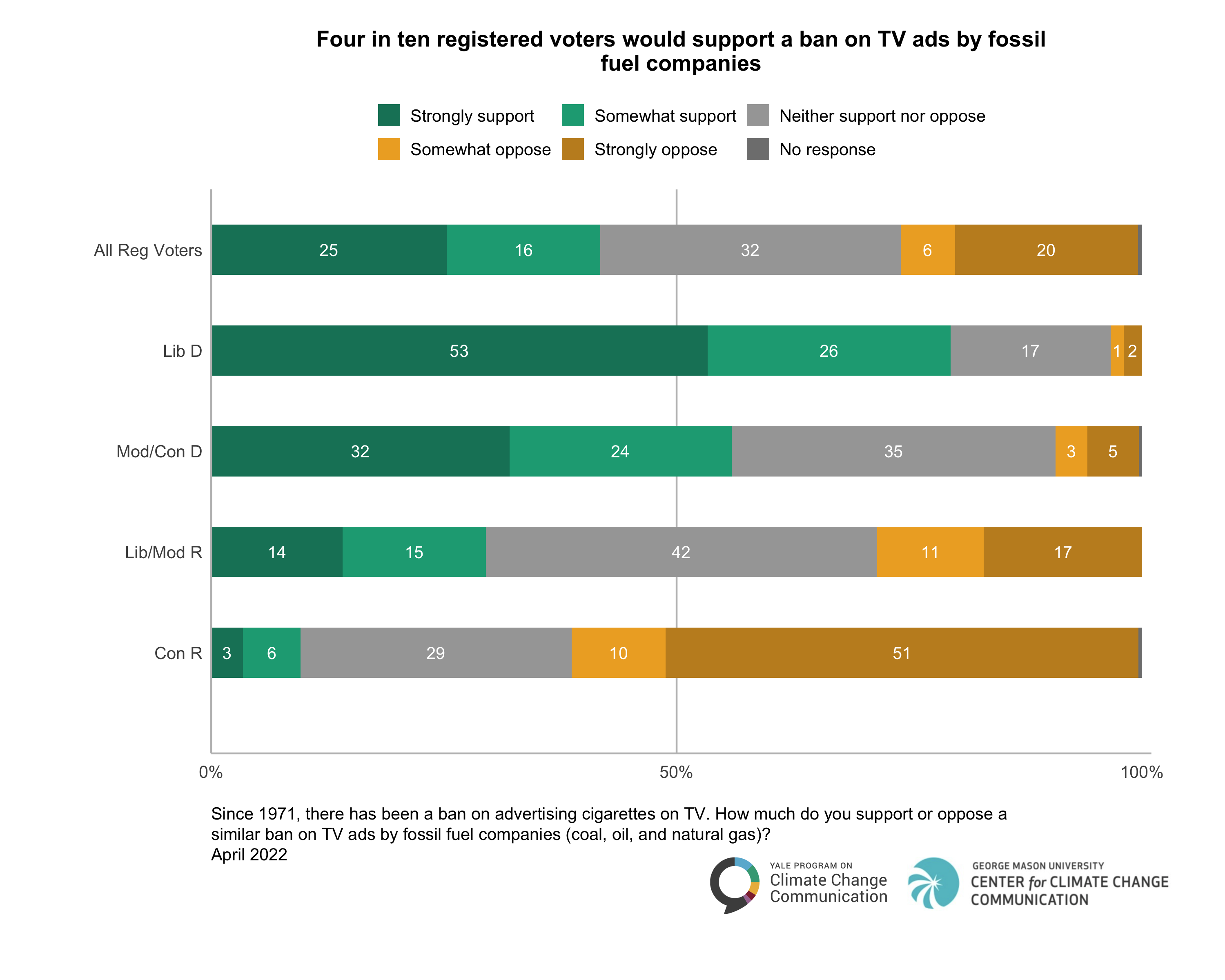Report · Jul 7, 2022
Politics & Global Warming, April 2022
By Anthony Leiserowitz, Edward Maibach, Seth Rosenthal, John Kotcher, Jennifer Carman, Liz Neyens, Teresa Myers, Matthew Goldberg, Eryn Campbell, Karine Lacroix and Jennifer Marlon
Filed under: Policy & Politics and Behaviors & Actions
3. Support for Policies to Reduce the Pollution that Causes Global Warming
3.1. Most registered voters, including many Republicans, support climate-friendly energy policies.
Registered voters across the political spectrum support many energy policies designed to reduce carbon pollution and fossil fuel dependence and promote clean energy, including:
- Providing tax incentives or rebates to homeowners, landlords, and businesses to make existing buildings more energy efficient: 87% of registered voters; 99% of liberal Democrats and 93% of moderate/conservative Democrats, 78% of liberal/moderate Republicans, and 73% of conservative Republicans.
- Funding more research into renewable energy sources: 79% of registered voters; 97% of liberal Democrats, 93% of moderate/conservative Democrats, 77% of liberal/moderate Republicans, and 52% of conservative Republicans.
- Providing tax rebates to people who purchase energy-efficient vehicles or solar panels: 77% of registered voters; 98% of liberal Democrats, 92% of moderate/conservative Democrats, 68% of liberal/moderate Republicans, and 51% of conservative Republicans.
- Providing federal funding to make residential buildings in low-income communities more energy efficient: 77% of registered voters; 97% of liberal Democrats, 92% of moderate/conservative Democrats, 68% of liberal/moderate Republicans, and 52% of conservative Republicans.
- Providing tax incentives or rebates to homeowners, landlords, and businesses to purchase appliances that can be powered without burning fossil fuels (such as electric water heaters, electric heat pumps, and electric induction cooktops): 77% of registered voters; 98% of liberal Democrats, 92% of moderate/conservative Democrats, 70% of liberal/moderate Republicans, and 48% of conservative Republicans.
- Regulating carbon dioxide as a pollutant: 74% of registered voters; 97% of liberal Democrats, 88% of moderate/conservative Democrats, 74% of liberal/moderate Republicans, and 43% of conservative Republicans.
- Transitioning the U.S. economy (including electric utilities, transportation, buildings, and industry) from fossil fuels to 100% clean energy by 2050: 69% of registered voters; 98% of liberal Democrats, 86% of moderate/conservative Democrats, 63% of liberal/moderate Republicans, and 32% of conservative Republicans.
- Increasing federal funding to low-income communities and communities of color who are disproportionately harmed by air and water pollution: 69% of registered voters; 98% of liberal Democrats, 85% of moderate/conservative Democrats, 58% of liberal/moderate Republicans, and 32% of conservative Republicans.
- Requiring fossil fuel companies to pay a tax on the carbon pollution they produce, and using that revenue to reduce other taxes (such as the federal income tax) by an equal amount [i.e., a revenue-neutral carbon tax]: 66% of registered voters; 92% of liberal Democrats, 85% of moderate/conservative Democrats, 61% of liberal/moderate Republicans, and 30% of conservative Republicans.
- Requiring electric utilities to produce 100% of their electricity from renewable energy sources by 2035: 63% of registered voters; 94% of liberal Democrats, 83% of moderate/conservative Democrats, 55% of liberal/moderate Republicans, and 22% of conservative Republicans.
3.2. A large majority of registered voters support renewable energy generation on public land.
A large majority of registered voters (81%) support generating renewable energy (solar and wind) on public land in the United States. This includes nearly all liberal Democrats (98%) and moderate/conservative Democrats (90%) as well as a large majority of liberal/moderate Republicans (77%) and a majority of conservative Republicans (59%).
Smaller majorities of registered voters support fossil-fuel production in the United States, including:
- Expanding offshore drilling for oil and natural gas off the U.S. coast: 58% of registered voters; 84% of conservative Republicans, 67% of liberal/moderate Republicans, 56% of moderate/conservative Democrats, and 31% of liberal Democrats.
- Drilling for and mining fossil fuels (coal, oil, and natural gas) on public land in the U.S.: 55% of registered voters; 84% of conservative Republicans, 70% of liberal/moderate Republicans, 46% of moderate/conservative Democrats, and 27% of liberal Democrats.
3.3. Most registered voters support conservation and restoration policies.
Registered voters across the political spectrum support a range of conservation and restoration policies, including:
- Providing federal funding to help farmers improve practices to protect and restore the soil so it absorbs more carbon: 86% of registered voters; 98% of liberal Democrats, 93% of moderate/conservative Democrats, 86% of liberal/moderate Republicans, and 70% of conservative Republicans.
- Re-establishing the Civilian Conservation Corps, which would employ workers to protect natural ecosystems, plant trees in rural and urban areas, and restore the soil on farmlands: 86% of registered voters; 97% of liberal Democrats, 91% of moderate/conservative Democrats, 86% of liberal/moderate Republicans, and 69% of conservative Republicans.
- Creating a jobs program that would hire unemployed oil and gas workers to safely close down thousands of abandoned oil and gas wells, which are a source of water and methane pollution: 80% of registered voters; 97% of liberal Democrats, 91% of moderate/conservative Democrats, 79% of liberal/moderate Republicans, and 56% of conservative Republicans.
- Creating a jobs program that would hire unemployed coal workers to safely close down old coal mines and restore the natural landscape: 80% of registered voters; 99% of liberal Democrats, 89% of moderate/conservative Democrats, 78% of liberal/moderate Republicans, and 56% of conservative Republicans.
3.4. A majority of registered voters would support a president declaring a national emergency to act on global warming.
More than half of registered voters (58%) would “strongly” or “somewhat” support a U.S. president declaring global warming a national emergency to act on it if Congress does not take action (see data tables in the PDF version of the report, p. 51). This has the support of nearly all liberal Democrats (95%, with 65% saying they “strongly support” it; see data tables), a large majority of moderate/conservative Democrats (77%), about half of Independents (55%; see data tables in the PDF version of the report, p. 51), and 46% of liberal/moderate Republicans. By contrast, few conservative Republicans (16%) would support it, while 84% of conservative Republicans would oppose it (including 64% who would “strongly oppose” it, see data tables, p. 51).
3.5. Four in ten registered voters would support a ban on TV ads by fossil fuel companies.
Since 1971, there has been a ban in the United States on advertising cigarettes on TV. With this as context, we asked how much respondents support or oppose a similar ban on TV ads by fossil fuel companies. About four in ten registered voters (42%) would support such a ban. This includes majorities of liberal Democrats (79%) and moderate/conservative Democrats (56%), but fewer Independents (36%), liberal/moderate Republicans (29%), and conservative Republicans (10%).
